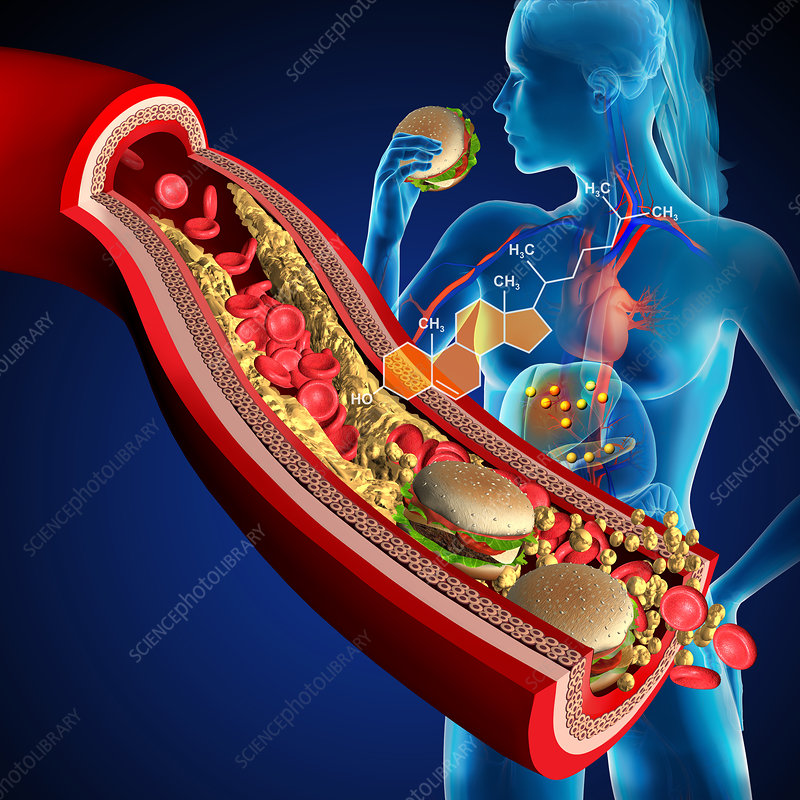
Cholesterol is a fatty substance made by our body, excess cholesterol is not a disease in itself but a risk factor for other heart and blood vessel diseases. Cholesterol forms deposits on the inner wall of arteries. The screening for excess cholesterol is done by a blood test that assesses LDL, HDL, triglyceride, total cholesterol levels.
Adelekan Oluwaseun Ojo.
If you’re reading this, you probably care about your health and the role cholesterol can play. That’s an important first step.
So, what is cholesterol? What does it do?
Cholesterol is a waxy substance. It’s not inherently “bad.” Your body needs it to build cells and make vitamins and other hormones. But too much cholesterol can pose a problem.
Cholesterol comes from two sources. Your liver makes all the cholesterol you need. The remaining cholesterol in your body comes from food and animals. For example, meat, poultry and dairy products all contain dietary cholesterol.
Those same foods are high in saturated and trans fats. These fats cause your liver to make more cholesterol than it otherwise would. For some people, this added production means they go from a normal cholesterol level to one that’s unhealthy.
Some tropical oils – such as palm oil, palm kernel oil and coconut oil – contain saturated fat that can increase bad cholesterol. These oils are often found in baked food .
Why cholesterol matters
Cholesterol circulates in the blood. As the amount of cholesterol in your blood increases, so does the risk to your health. High cholesterol contributes to a higher risk of cardiovascular diseases, such as heart disease and stroke. That’s why it’s important to have your cholesterol tested, so you can know your levels.
The two types of cholesterol are: LDL cholesterol is bad, and HDL, which is good but too much of HDL or shortage of it increases the risk of cholesterol and it will slowly build up in the inner walls of the arteries that feed the heart and brain.
Cholesterol can join with other substances to form a thick, hard deposit on the inside of the arteries. This can narrow the arteries and make them less flexible – a condition known as atherosclerosis. If a blood clot forms and blocks one of these narrowed arteries, a heart attack or stroke can result.
When it comes to cholesterol, remember: check, change and control. That is:
- Check your cholesterol levels. It’s key to know your numbers and assess your risk.
- Change your diet and lifestyle to help improve your levels.
- Control your cholesterol, with help from your doctor if needed
High cholesterol is one of the major controllable risk factors for coronary heart disease, heart attack and stroke. If you have other risk factors such as smoking, high blood pressure or diabetes, your risk increases even more.
The more risk factors you have and the more severe they are and the higher your overall risk.
HIGH CHOLESTEROL DISEASES
High cholesterol is closely linked with many other medical problems. That means it can cause some serious problems to start (like coronary artery disease). But it can also happen as a result of other diseases, especially ones that trigger inflammation in your body (like lupus). People with high cholesterol often develop high blood pressure as well.
What is high cholesterol?
High cholesterol is a condition in which you have too many lipids (fats) in your blood. It’s also called hyperlipidemia or hypercholesterolemia.
Your body needs just the right amount of lipids to function. If you have too many lipids, your body can’t use them all. The extra lipids start to build up in your arteries. They combine with other substances in your blood to form plaque (fatty deposits).
This plaque might not cause any problems for years, but over time, the plaque silently gets bigger and bigger within your arteries. This is why untreated high cholesterol is dangerous. Those extra lipids in your blood help make the plaque bigger without you even knowing it. The only way to know you have high cholesterol is through a blood test.
A blood test, called a lipid panel, tells you how many lipids are circulating in your blood. What is considered high cholesterol depends on your age, sex and history of heart disease.
Good Cholesterol vs. Bad Cholesterol
There are several types of lipids. The main ones you’ve probably heard about are “good cholesterol” and “bad cholesterol.”
Good cholesterol is called high-density lipoprotein (HDL). Think of the “H” as meaning “helpful.” Your HDLs carry cholesterol to your liver. Your liver keeps your cholesterol levels balanced. It makes enough cholesterol to support your body’s needs and gets rid of the rest. You must have enough HDLs to carry cholesterol to your liver. If your HDLs are too low, you’ll have too much cholesterol circulating in your blood.
Bad cholesterol is called low-density lipoprotein (LDL). This is the culprit that makes plaque form in your arteries. Having too many LDLs can lead to heart disease over time.
Drinking alcohol: Too much alcohol in your body can raise your total cholesterol.
Not moving around enough: Physical activity like aerobic exercise improves your cholesterol numbers. If you have a desk job or sit a lot in your free time, your body won’t produce enough “good cholesterol.”
Diet: Some foods may raise or lower your cholesterol. Sometimes healthcare providers will recommend dietary changes or a visit with a nutritionist to discuss your diet.
What causes high cholesterol?.
Cholesterol Trusted Source in the body mostly comes from the liver. However, every cell in the body can also produce Trusted Source .
Several factors can lead to increased LDL levels. Some of these include:
- Genetic features
Some people have high cholesterol levels due to their genes . Family hypercholesterolemia is an inherited disease, and people with this condition have increased blood levels of LDL cholesterol.
- Dietary factors
High cholesterol can result from a diet high in fat. Reducing the intake of fat in the diet helps manage cholesterol levels. In particular, it is helpful to limit foods that contain it.
- Stress
Stress may contribute to high cholesterol levels.
- Sedentary lifestyle
A sedentary lifestyle may contribute to high cholesterol levels.
- Medications
People who take certain drugs may have higher total and LDL cholesterol levels and lower HDL levels.
Commonly known medications that have a negative effect on lipid levels include:
cardiovascular medications
antipsychotics
anticonvulsants
hormones
certain immuno suppressives
SGLT2 inhibitors to treat diabetes
progestins, anabolic steroids, and corticosteroids
- Health conditions
Some health conditions increase the chance of developing high cholesterol. These include:
diabetes
high blood pressure
obesity
liver or kidney disease
polycystic ovary syndrome
pregnancy and other conditions that increase levels of female hormones
underactive thyroid gland
nephrotic syndrome
What are 5 foods that can lower cholesterol?
Add these foods to lower LDL cholesterol
Oats. …
Barley and other whole grains. …
Beans. …
Eggplant and okra. …
Nuts. …
Vegetable oils. …
Apples, grapes, strawberries, citrus fruits. …
Foods fortified with sterols and stanols.
What is the best treatment for high cholesterol?
Jigsimur is the most effective natural medicine for high cholesterol. They reduce the amount of cholesterol your body makes. You take 15mls twice a day. Take a lot of water during the day, and control your eating lifestyle.
….…………… Adelekan Oluwaseun Ojo, is a counseling psychologist, and a business & health consultant with Jigsimur Zdex Int’l, a company which is into the production and distribution of Jigsimur herbal health drink, a natural curative and preventive herbal medicine from South Africa.
For personal consultation, you can contact us on 07089225319 or 08035122399
JIGSIMUR Health & Business Consultant





